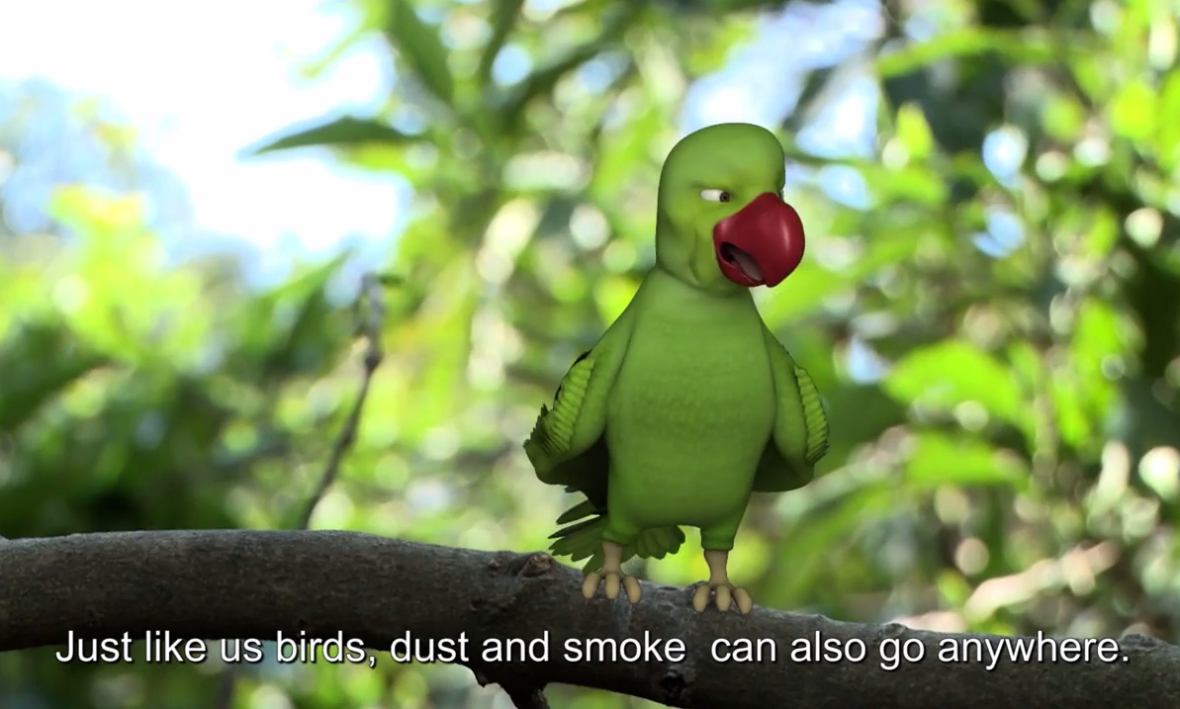Headline:
“Smoke” in the Fight against Air Pollution in the Himalayas: IASS, ICIMOD and MaHa Sanchar Produce a Telefilm
Entertainment and Education

What do you get when two scientists and two comedians try to raise awareness about air pollution in the Himalayas? In the case of the IASS and its partners in Nepal: a film that’s definitely more than just smoke and mirrors.
Air pollution is a serious environmental hazard in many parts of the world. In the Himalayas, it is having especially drastic effects on snow, glaciers and tourism as well as on human health. An estimated 30,000 Nepalese die every year due to air pollution. In an effort to raise awareness of this growing problem among the wider public in Nepal, the International Centre for Integrated Mountain Development (ICIMOD) and the IASS joined forces with MaHa Sanchar – an organisation founded by the veteran comedy duo Madan Krishna Shrestha and Hari Bansha Acharya – to produce a telefilm as part of the joint IASS/ICIMOD project “Sustainable Atmosphere for the Kathmandu Valley” (SusKat). “Dhuwa” (Smoke) premiered on 1 October in Kathmandu. The film informs viewers about the main sources of air pollution, such as vehicles, the brick industry and open fires, describes its devastating effects on human health and the climate, and points to simple measures individuals can take to reduce it. But it does so in a humorous way that is sure to appeal to a broad Nepali audience. Madan Krishna Shrestha and Hari Bansha Acharya, both household names in Nepal, star as two middle-aged men who are blissfully ignorant of their personal contribution to air pollution until they both land in hospital. The film is interlaced with animated sequences, in which two parrots, voiced by the two comedians, set out to spread their newly acquired knowledge about air pollution.

The challenge: making an entertaining film on a “dry subject”
Last week’s premiere in Kathmandu was attended by both comedians and over 250 invited distinguished guests from Nepalese government agencies, including the National Planning Commission and the Ministry of the Science, Technology and Environment, as well as representatives of academia, industry, associations, international agencies, the media, and the IASS and ICIMOD. At the premiere, Hari Bansha Acharya and Madan Krishna Shrestha walked the audience through their experience of producing the film, admitting that making a telefilm on such a “dry subject” was a challenge when people are “used to watching romantic and action-packed films.”
David Molden, Director General of ICIMOD, praised the successful collaboration of ICIMOD and the IASS with MaHa Sanchar, where scientists and artists worked together to highlight the important environmental issues of the region. For Maheswar Rupakheti, Group Leader of SusKat at the IASS, the telefilm conveys its messages in a very effective way because it considers local specifics, including Nepalese culture. The 40-minute long telefilm will be aired on Nepal Television soon and will be made available to the public via various online platforms. The IASS is also planning to screen the film in Berlin or Potsdam in the near future.

IASS research on air pollution in the Himalayas
In addition to the research undertaken by the SusKat project, the activities of the IASS in the Himalaya region include its participation in an Asia Regional Assessment on Short-Lived Climate-forcing Pollutants (SLCPs), which is coordinated by the Climate and Clean Air Coalition (CCAC). The Assessment will identify technical measures, policy options and institutional arrangements that bring the largest health, climate and development benefits to countries in Asia. A first meeting of the Asia Assessment authors is scheduled to take place on 24–25 November 2015 in Bangkok. Furthermore, as one of the lead partners of the CCAC’s brick production initiative, the IASS is providing information and advice to actively support the more sustainable reconstruction of brick factories. The IASS project ‘Environmental Law and Institutions for Air, Climate, and Sustainability’ (ELIAS) collaborates closely with SusKat on the implementation of scientific findings.
More information:
- Watch “Dhuwa” on Youtube
- Research project: “Sustainable Atmosphere for the Kathmandu Valley” (SusKat), headed by Maheswar Rupakheti
- Research project: “Environmental Law and Institutions for Air, Climate, and Sustainability” (ELIAS), headed by Birgit Lode, who also coordinates the IASS work with the CCAC
- Asia Regional Assessment on Short-Lived Climate-forcing Pollutants (SLCPs), coordinated by the Climate and Clean Air Coalition (CCAC)
15.10.2015

